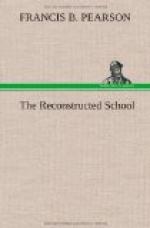We all recognize C. Hanford Henderson as one of our most fertile and sane writers on educational themes and we cannot do better just here than to quote, even at some length, from his facile pen: “To say of man or woman that they have no imagination is to convict them of many actual and potential sins. Such a defect means obtuseness in manners and morals, sterility in arts and science, blundering in the general conduct of life. Children are often accused of having too much imagination, but in reality that is hardly possible. The imagination may run riot, and, growing by what it feeds upon, come dangerously near to untruthfulness,—the store of facts may have been too small. But the remedy is not to cripple or kill the imagination; it is rather to provide the needed equipment of facts and to train the imagination to work within the limits of truth and probability. The unimaginative man is exceedingly dull company. From the moment he opens his eyes in the morning until he closes them at night, he is prone to the sins of both omission and commission. No matter how good his intentions, he constantly offends. No matter how great his industry, he fails to attain. One can trace many immoralities, from slight breaches of manners to grave criminal offenses, to a simple lack of imagination. The offender failed to see,—he was, to all intents and purposes, blind. At its best, imagination is insight. It is the direct source of most of our social amenities, of toleration, charity, consideration,—in a word, of all those social virtues which distinguish the child of light.” Another fertile writer says: “Many a child has been driven with a soul-wound into corroding silence by parents who thought they were punishing falsehood when they were in reality repressing the imagination—the faculty which master-artists denote as the first and loveliest possession of the creative mind.”
Some of our boys will be farmers but, if they lack imagination, they will be dull fellows, at the very best, and, relatively speaking, not far above the horse that draws the plow. The girls will be able to talk, but if they lack imagination they can never become conversationalists. The person who has imagination can cause the facts of the multiplication table to scintillate and glow. The person who lacks imagination is unable to invest with interest and charm even the mountain, the river, the landscape, or the poem. The gossip, the scandal-monger, or the coarse jester proves his lack of imagination and his consequent inability to hold his own in real conversation. We hope, of course, that some of our pupils may become inventors, but this will be impossible unless they possess imagination. A sociologist states the case in this fashion: “Wealth, the transient, is material; achievement, the enduring, is immaterial. The products of achievement are not material things at all. They are not ends, but means. They are methods, ways, devices, arts, systems, institutions. In a word, they are inventions.” In short, to say that one is an inventor is but another way of saying that he has imagination.




